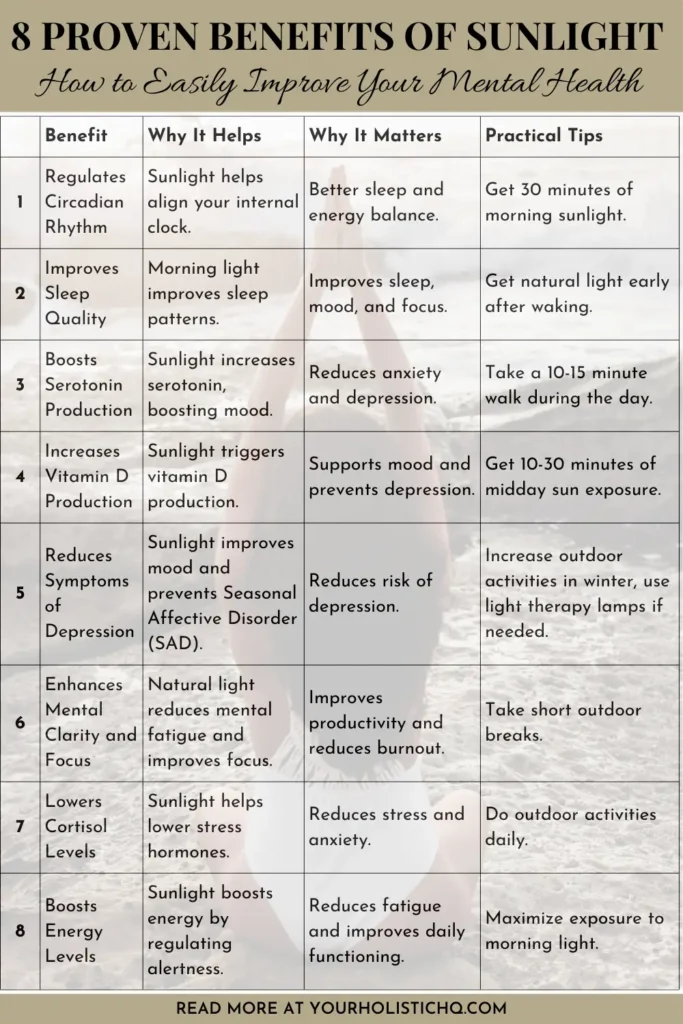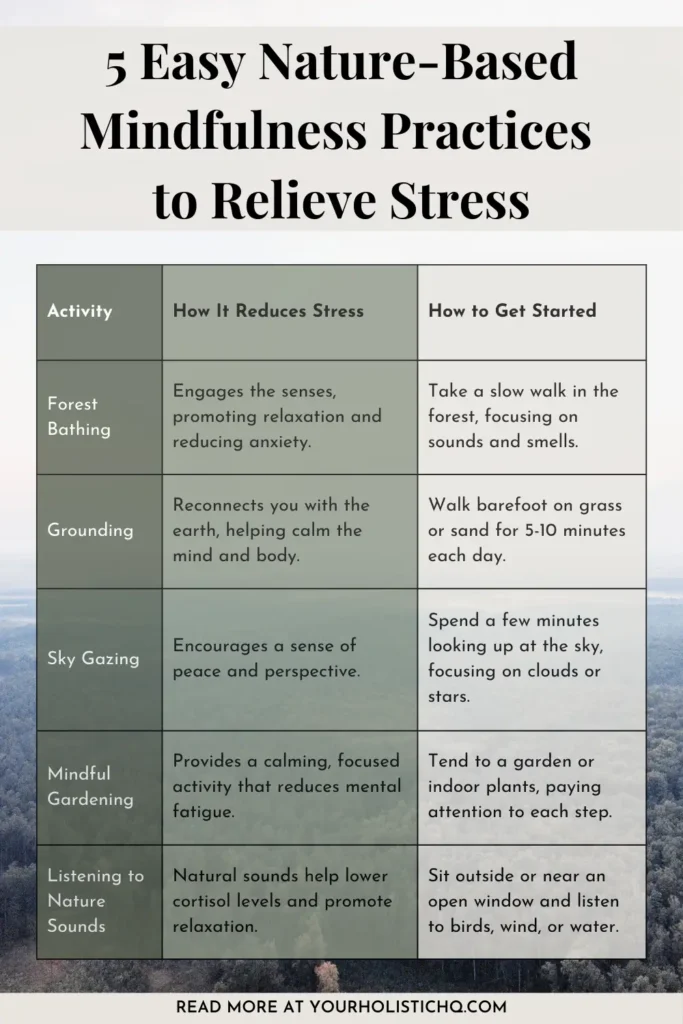5 Ways Nature Can Help Reduce Stress and Improve Mental Health

With the relentless pressures of daily life, discovering effective ways to manage stress has become more important than ever. Increasingly, evidence shows that spending time in nature is not just a pleasant escape but a powerful tool for enhancing mental health. Nature’s restorative powers are backed by science, offering tangible benefits that go beyond mere relaxation.
In this article, we delve into five compelling ways that nature can help reduce stress and boost mental well-being. By incorporating these natural strategies into your routine, you can significantly improve your mental health and overall quality of life.
Can Nature Heal Anxiety?
Yes, nature can play a significant role in healing anxiety. Studies have shown that spending time in natural environments can reduce symptoms of anxiety by lowering cortisol levels, enhancing mood, and promoting relaxation. Activities such as walking in the park, hiking, or simply being surrounded by greenery can help calm the mind and provide a sense of peace. Nature’s ability to engage our senses and provide a break from the constant stimuli of modern life makes it an effective and accessible tool for managing anxiety.


1. Exposure to Natural Light

Natural light is a fundamental element that significantly impacts our mental health. Exposure to sunlight triggers a series of biological processes that enhance our well-being, making it a critical component of stress reduction and mental health improvement. Natural light plays a crucial role in regulating our circadian rhythms, the internal clocks that govern our sleep-wake cycles. These rhythms are synchronized by the natural light-dark cycle. When we spend time outdoors during daylight hours, our bodies receive cues that help regulate sleep patterns. Adequate exposure to natural light, particularly in the morning, can help reset these rhythms, leading to better sleep quality. Improved sleep is directly linked to reduced stress and enhanced mental health.
Sunlight exposure also increases the production of serotonin, a neurotransmitter often referred to as the “happiness hormone.” Serotonin levels influence mood, anxiety, and happiness. Higher levels of serotonin contribute to feelings of well-being and calm. This biochemical response explains why people often feel more energized and in a better mood on sunny days. Additionally, natural light is essential for the production of vitamin D, often called the “sunshine vitamin.” This vitamin is crucial for various bodily functions, including the regulation of mood. Deficiency in vitamin D has been linked to depression and other mood disorders. By spending time outdoors, we can ensure adequate vitamin D levels, supporting overall mental health and reducing stress.
Incorporating natural light into our daily routines can have profound effects on our mental health. Practical ways to maximize exposure include spending at least 30 minutes outside in the morning, taking short outdoor breaks during the workday, and engaging in outdoor physical activities. Optimizing indoor spaces to maximize natural light, such as through large windows or skylights, can also mimic the effects of being outdoors. By understanding and utilizing the benefits of natural light, we can enhance our mental health, reduce stress, and improve overall well-being.
2. Physical Activity

Physical activity is a vital component in reducing stress and improving mental health. Engaging in regular exercise, especially in natural environments, triggers the release of endorphins, the body’s natural mood lifters. These endorphins interact with receptors in the brain, reducing the perception of pain and triggering a positive feeling in the body, similar to that of morphine. This phenomenon, often referred to as the “runner’s high,” can be achieved through various forms of physical activity such as walking, running, cycling, or even gardening. The combination of physical exertion and the calming influence of nature significantly amplifies these benefits, making outdoor exercise an effective strategy for managing stress.
Regular physical activity also reduces levels of cortisol, a hormone directly associated with stress. High cortisol levels over extended periods can lead to various health issues, including anxiety and depression. Exercise helps to mitigate these effects by promoting the body’s ability to handle stress more efficiently. Furthermore, engaging in physical activities outdoors provides an opportunity to break away from the monotonous routines and environments that often contribute to mental fatigue. This change of scenery and routine can rejuvenate the mind and body, enhancing overall cognitive function and emotional resilience.
Incorporating physical activity into your daily routine doesn’t require extensive time or effort. Simple strategies such as taking a brisk walk during lunch breaks, participating in weekend hikes, or cycling to work can make a substantial difference. The key is consistency and making exercise a regular part of your lifestyle. Additionally, combining physical activity with social interaction, such as joining a sports team or walking group, can further enhance its stress-relieving benefits by providing emotional support and fostering a sense of community. By embracing physical activity, particularly in natural settings, we can significantly improve our mental health and overall well-being.
3. Mindfulness and Presence

Mindfulness and presence are powerful practices for reducing stress and enhancing mental health, particularly when engaged in natural settings. Being in nature encourages a state of mindfulness, where individuals can focus on the present moment without judgment. This practice helps break the cycle of stress-inducing thoughts and anxiety, allowing the mind to rest and recuperate. Nature’s inherently calming and grounding qualities provide an ideal backdrop for mindfulness, making it easier to achieve a state of presence and awareness.
Practicing mindfulness in natural environments can significantly lower stress levels and improve overall well-being. Activities such as forest bathing, where one immerses themselves in the natural environment and mindfully experiences the sights, sounds, and smells of the forest, have been shown to reduce cortisol levels and enhance mood. Similarly, mindful walking or meditating by a stream can help individuals connect with their surroundings and themselves, fostering a deep sense of peace and relaxation. These practices not only reduce immediate stress but also build long-term resilience against anxiety and mental fatigue.
Incorporating mindfulness and presence into daily routines can be both simple and profoundly impactful. Begin by setting aside time each day to be outdoors, whether it’s a quiet moment in a garden or a walk in the park. Focus on breathing deeply and observing your surroundings with curiosity and openness. Let go of distractions and allow yourself to fully experience the present moment. Over time, these practices can transform how you respond to stress, enhancing your ability to remain calm and centered amidst life’s challenges. By embracing mindfulness and presence in nature, you can cultivate a healthier, more balanced state of mind.
4. Reduction of Mental Fatigue

Nature’s role in reducing mental fatigue is increasingly recognized as a vital component of mental health. Mental fatigue often results from prolonged periods of concentration and cognitive effort, leading to decreased performance and increased stress. Natural environments provide a restorative backdrop that allows the mind to recover from this exhaustion. Unlike urban settings, which bombard the senses with constant stimuli, nature offers a more soothing and less demanding sensory experience, enabling the brain to relax and rejuvenate.
Studies have shown that even brief interactions with nature can significantly improve cognitive function and reduce mental fatigue. For instance, taking a short walk in a park or even viewing scenes of nature from a window can help restore attention and enhance mental clarity. This phenomenon, known as attention restoration theory, suggests that natural environments replenish our cognitive resources, making us better equipped to handle tasks that require sustained focus and mental effort. The effortless engagement with natural settings allows the mind to rest and recover, reducing feelings of burnout and improving overall mental performance.
To leverage the benefits of nature in reducing mental fatigue, incorporate regular breaks in natural settings into your daily routine. Spend lunchtime in a nearby park, take a scenic route on your commute, or simply ensure your workspace has views of greenery. These small changes can make a significant difference in managing mental exhaustion. Additionally, planning regular outings to more immersive natural environments, such as forests or beaches, can provide deeper restorative experiences. By prioritizing time in nature, you can effectively combat mental fatigue, leading to improved focus, productivity, and overall mental health.
5. Social Connection

Social connection is a crucial factor in mental health, and nature provides an ideal setting for fostering meaningful relationships. Engaging in outdoor activities often involves social interaction, whether it’s hiking with friends, participating in community gardening, or joining outdoor fitness classes. These shared experiences in natural environments can strengthen bonds and create a sense of community, which are essential for emotional well-being. Being socially connected helps reduce feelings of loneliness and isolation, both of which are significant contributors to stress and mental health issues.
The social benefits of nature extend beyond mere companionship. Nature-based activities often encourage cooperation, teamwork, and mutual support. For instance, group hiking requires communication and collaboration, while community gardening fosters a shared sense of purpose and achievement. These interactions not only enhance social skills but also build trust and empathy among participants. The combination of physical activity, natural surroundings, and social engagement creates a powerful synergy that boosts mood and reduces stress. Additionally, social connections formed in natural settings tend to be more relaxed and informal, allowing for deeper and more authentic relationships.
Incorporating social activities in natural environments into your routine can have profound effects on your mental health. Plan regular outings with family or friends, join local outdoor clubs or groups, and participate in community events held in parks or natural reserves. These activities not only provide the benefits of nature but also help you build and maintain a strong social network. By leveraging the social aspects of nature, you can enhance your emotional resilience, reduce stress, and improve your overall quality of life.
Final Thoughts

Incorporating nature into our daily lives can profoundly impact our mental health and well-being. From exposure to natural light and engaging in physical activity, to practicing mindfulness and presence, reducing mental fatigue, and fostering social connections, the benefits are vast and well-supported by research. Each element plays a critical role in reducing stress and enhancing overall mental health, providing practical, accessible strategies for improvement.
By making small, intentional changes to include more time in nature, you can experience significant enhancements in your mood, cognitive function, and emotional resilience. Whether it’s a morning walk, a weekend hike, or simply spending time in a green space, these practices offer a natural and effective way to manage stress and promote mental well-being.
Embrace the healing power of nature and make it an integral part of your lifestyle. The positive effects on your mental health will be profound, helping you lead a more balanced, fulfilling life.

















